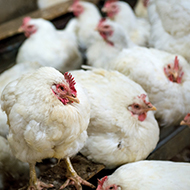
An investigation is underway to determine the source of the outbreak.
A strain of avian influenza has today (2 November) been confirmed at a small commercial farm in Kent.
According to the Department for Environment Food and Rural Affairs (Defra), the strain is H5N2 avian influenza.
All 480 birds on site, located near Deal, will be humanely culled to limit the spread of the disease. A 1km Low Pathogenic Avian Influenza (LPAI) Restricted Zone has also been placed around the infected premises to curb disease spread.
Public Health England said that the risk to public health from the virus is very low and the Food Standards Agency has made clear that bird flu does not pose a food safety risk for UK consumers. An official investigation is underway to determine the source of the outbreak.
Chief Veterinary Officer Christine Middlemiss said: “Avian flu has been confirmed at a small commercial premises in Kent. Immediate steps have been taken to limit the risk of the disease spreading and all remaining poultry and captive birds at the farm will be culled.
“Public Health England has confirmed that the risk to public health is very low and the Food Standards Agency has said that bird flu does not pose a food safety risk for UK consumers. There will be no impact on food supply as this business does not supply poultry meat or eggs to the commercial food chain.”
She added: “Bird keepers should remain alert for any signs of disease, report suspected disease immediately and ensure they are maintaining good biosecurity on their premises. We are urgently looking for any evidence of disease spread associated with this farm to control and eliminate it.”
Dr Gavin Dabrera, a consultant in acute respiratory infections at PHE, said: “Avian influenza remains an uncommon infection in humans and the risk to the UK population remains very low – we will continue working with Defra and the local Health Protection Team to monitor the situation closely.
"Do not touch any sick or dead birds and make sure to wash your hands thoroughly with soap after contact with any animal.”
A Food Standards Agency spokesperson said: “The Food Standard Agency advises that, on the basis of the current scientific evidence, this strain of avian influenza does not pose a food safety risk for UK consumers.
“The wider risk posed by avian influenzas through the food chain is very low. Properly cooked poultry and poultry products, including eggs, remain safe to eat.”



 The Federation of Independent Veterinary Practices (FIVP) has announced a third season of its podcast, Practice Matters.
The Federation of Independent Veterinary Practices (FIVP) has announced a third season of its podcast, Practice Matters.